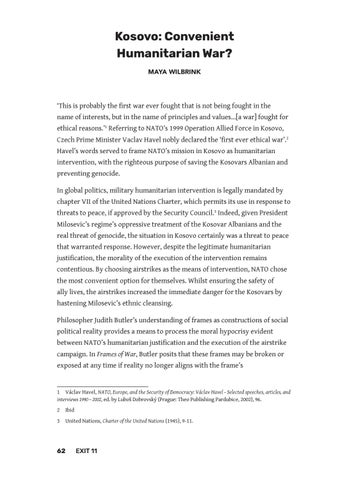Kosovo: Convenient Humanitarian War? MAYA WILBRINK
‘This is probably the first war ever fought that is not being fought in the name of interests, but in the name of principles and values...[a war] fought for ethical reasons.’1 Referring to NATO’s 1999 Operation Allied Force in Kosovo, Czech Prime Minister Vaclav Havel nobly declared the ‘first ever ethical war’.2 Havel’s words served to frame NATO’s mission in Kosovo as humanitarian intervention, with the righteous purpose of saving the Kosovars Albanian and preventing genocide. In global politics, military humanitarian intervention is legally mandated by chapter VII of the United Nations Charter, which permits its use in response to threats to peace, if approved by the Security Council.3 Indeed, given President Milosevic’s regime’s oppressive treatment of the Kosovar Albanians and the real threat of genocide, the situation in Kosovo certainly was a threat to peace that warranted response. However, despite the legitimate humanitarian justification, the morality of the execution of the intervention remains contentious. By choosing airstrikes as the means of intervention, NATO chose the most convenient option for themselves. Whilst ensuring the safety of ally lives, the airstrikes increased the immediate danger for the Kosovars by hastening Milosevic’s ethnic cleansing. Philosopher Judith Butler’s understanding of frames as constructions of social political reality provides a means to process the moral hypocrisy evident between NATO’s humanitarian justification and the execution of the airstrike campaign. In Frames of War, Butler posits that these frames may be broken or exposed at any time if reality no longer aligns with the frame’s 1 Václav Havel, NATO, Europe, and the Security of Democracy: Václav Havel - Selected speeches, articles, and interviews 1990 – 2002, ed. by Luboš Dobrovský (Prague: Theo Publishing Pardubice, 2002), 96. 2 Ibid 3 United Nations, Charter of the United Nations (1945), 9-11.
62
EXIT 11
